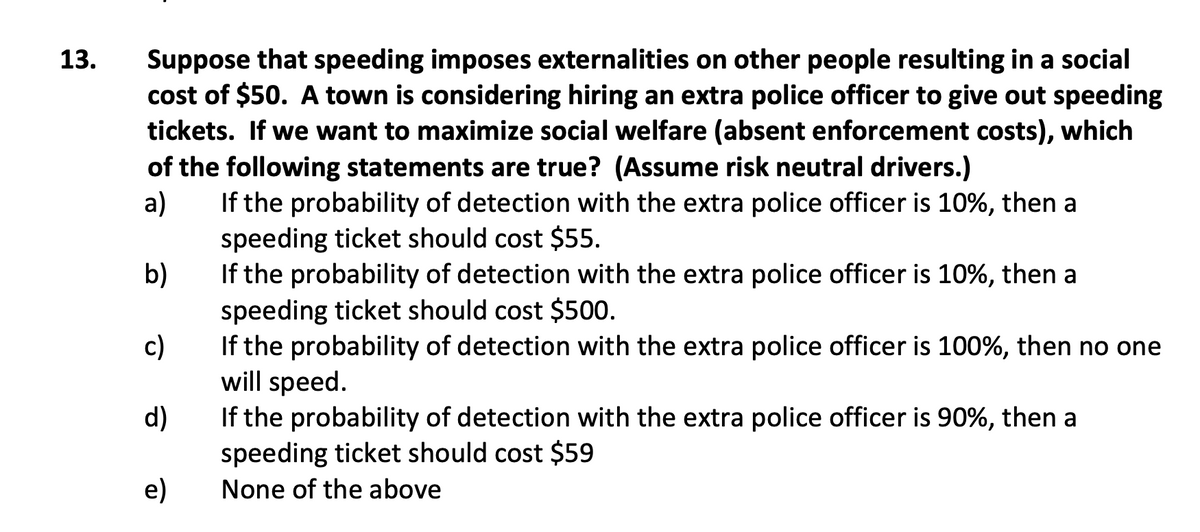Suppose that speeding imposes externalities on other people resulting in a social cost of $50. A town is considering hiring an extra police officer to give out speeding tickets. If we want to maximize social welfare (absent enforcement costs), which of the following statements are true? (Assume risk neutral drivers.) a) If the probability of detection with the extra police officer is 10%, then a speeding ticket should cost $55. b) If the probability of detection with the extra police officer is 10%, then a speeding ticket should cost $500. If the probability of detection with the extra police officer is 100%, then no one c) will speed. d) If the probability of detection with the extra police officer is 90%, then a speeding ticket should cost $59 e) None of the above
Suppose that speeding imposes externalities on other people resulting in a social cost of $50. A town is considering hiring an extra police officer to give out speeding tickets. If we want to maximize social welfare (absent enforcement costs), which of the following statements are true? (Assume risk neutral drivers.) a) If the probability of detection with the extra police officer is 10%, then a speeding ticket should cost $55. b) If the probability of detection with the extra police officer is 10%, then a speeding ticket should cost $500. If the probability of detection with the extra police officer is 100%, then no one c) will speed. d) If the probability of detection with the extra police officer is 90%, then a speeding ticket should cost $59 e) None of the above
Principles of Economics, 7th Edition (MindTap Course List)
7th Edition
ISBN:9781285165875
Author:N. Gregory Mankiw
Publisher:N. Gregory Mankiw
Chapter22: Frontiers Of Microeconomics
Section: Chapter Questions
Problem 6PA
Related questions
Question
Could Question 13 be answered?

Transcribed Image Text:Suppose that speeding imposes externalities on other people resulting in a social
cost of $50. A town is considering hiring an extra police officer to give out speeding
tickets. If we want to maximize social welfare (absent enforcement costs), which
of the following statements are true? (Assume risk neutral drivers.)
If the probability of detection with the extra police officer is 10%, then a
13.
a)
speeding ticket should cost $55.
b)
If the probability of detection with the extra police officer is 10%, then a
speeding ticket should cost $500.
c)
If the probability of detection with the extra police officer is 100%, then no one
will speed.
d)
If the probability of detection with the extra police officer is 90%, then a
speeding ticket should cost $59
e)
None of the above
Expert Solution
This question has been solved!
Explore an expertly crafted, step-by-step solution for a thorough understanding of key concepts.
This is a popular solution!
Trending now
This is a popular solution!
Step by step
Solved in 2 steps

Knowledge Booster
Learn more about
Need a deep-dive on the concept behind this application? Look no further. Learn more about this topic, economics and related others by exploring similar questions and additional content below.Recommended textbooks for you

Principles of Economics, 7th Edition (MindTap Cou…
Economics
ISBN:
9781285165875
Author:
N. Gregory Mankiw
Publisher:
Cengage Learning

Principles of Microeconomics (MindTap Course List)
Economics
ISBN:
9781305971493
Author:
N. Gregory Mankiw
Publisher:
Cengage Learning

Principles of Economics (MindTap Course List)
Economics
ISBN:
9781305585126
Author:
N. Gregory Mankiw
Publisher:
Cengage Learning

Principles of Economics, 7th Edition (MindTap Cou…
Economics
ISBN:
9781285165875
Author:
N. Gregory Mankiw
Publisher:
Cengage Learning

Principles of Microeconomics (MindTap Course List)
Economics
ISBN:
9781305971493
Author:
N. Gregory Mankiw
Publisher:
Cengage Learning

Principles of Economics (MindTap Course List)
Economics
ISBN:
9781305585126
Author:
N. Gregory Mankiw
Publisher:
Cengage Learning

Principles of Microeconomics
Economics
ISBN:
9781305156050
Author:
N. Gregory Mankiw
Publisher:
Cengage Learning

Principles of Economics 2e
Economics
ISBN:
9781947172364
Author:
Steven A. Greenlaw; David Shapiro
Publisher:
OpenStax